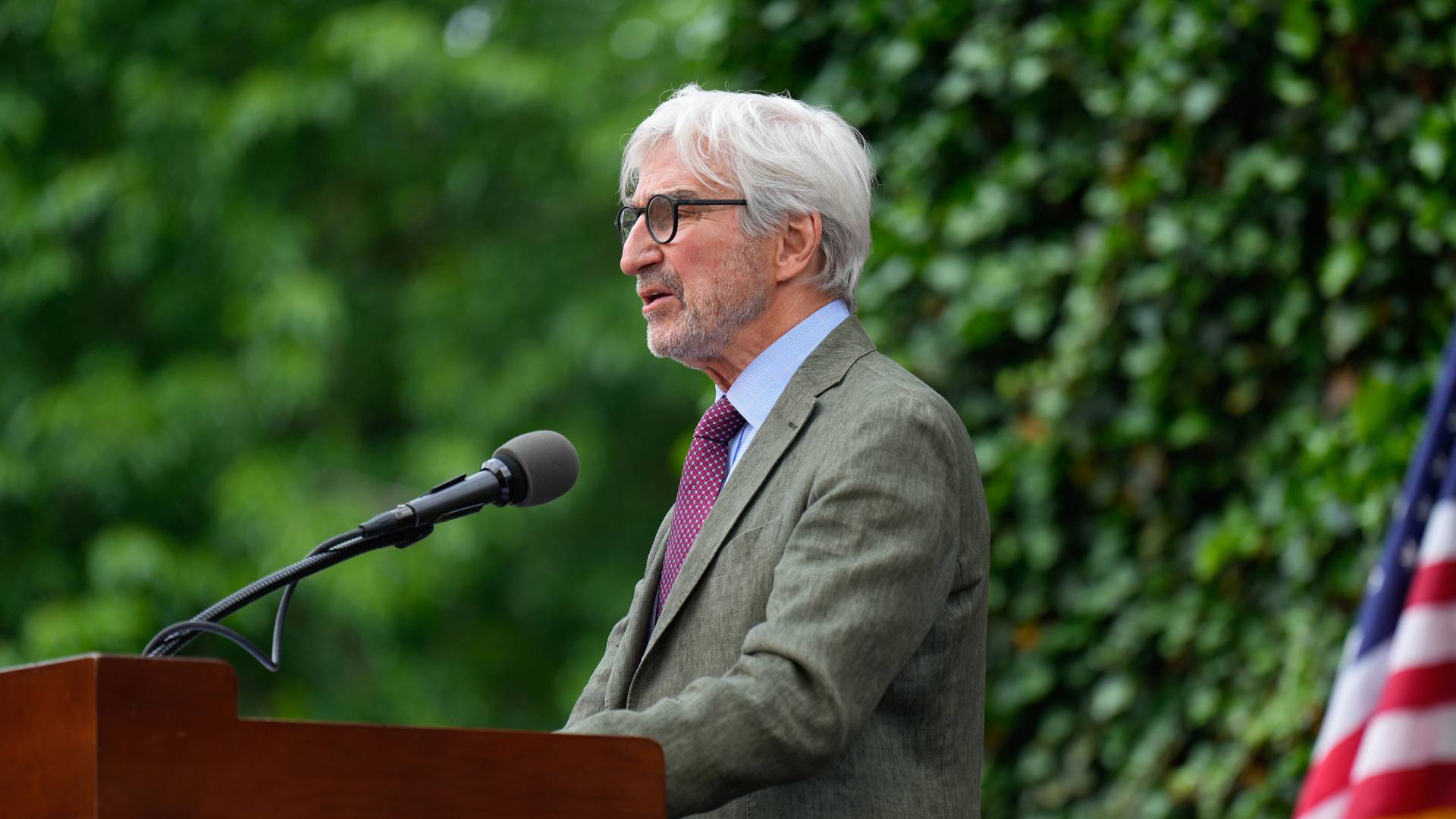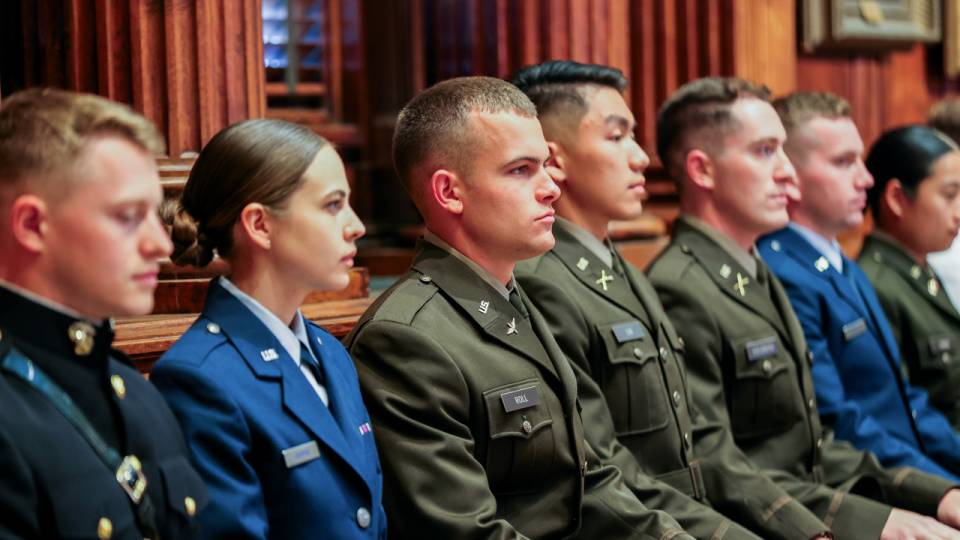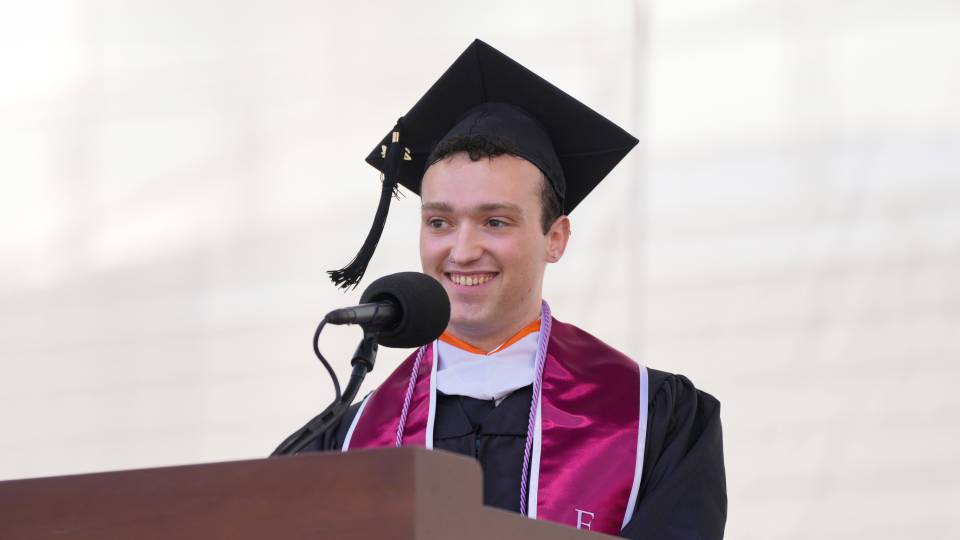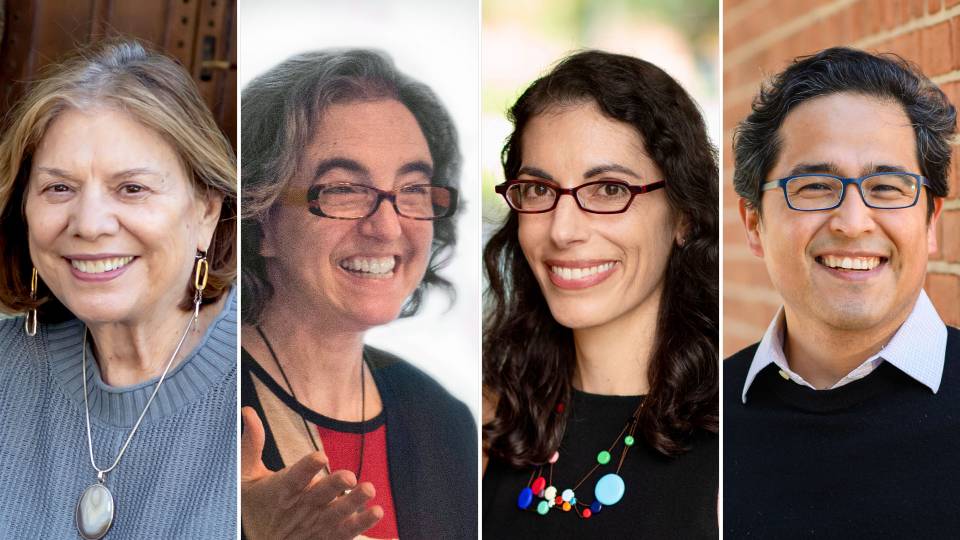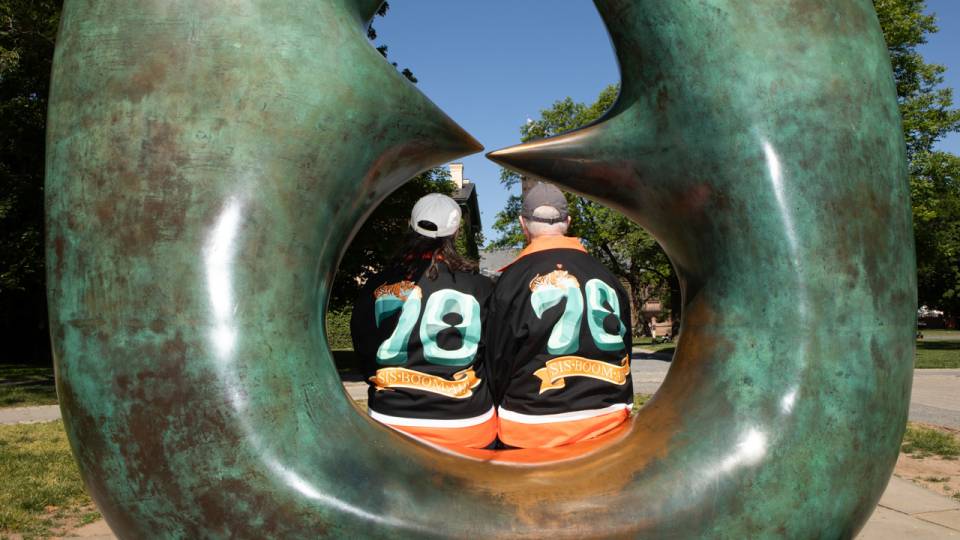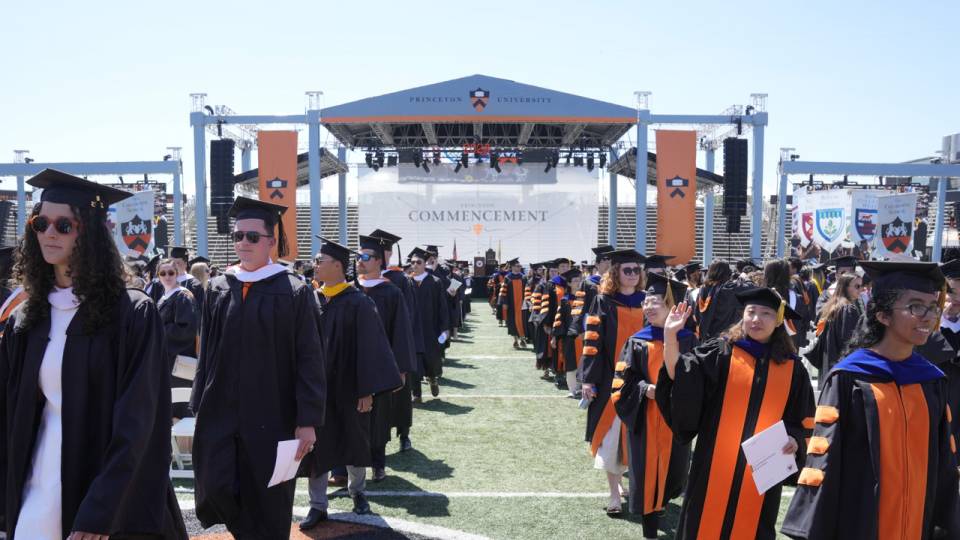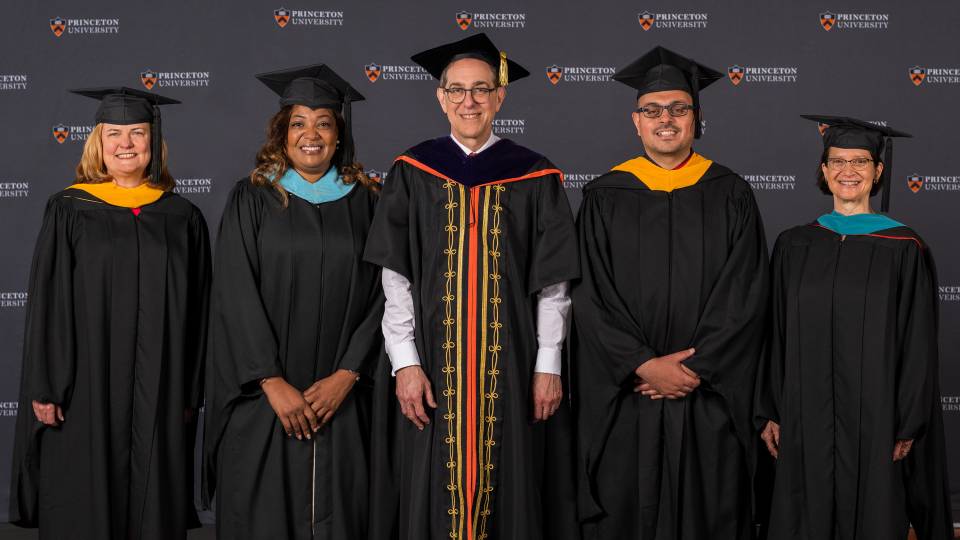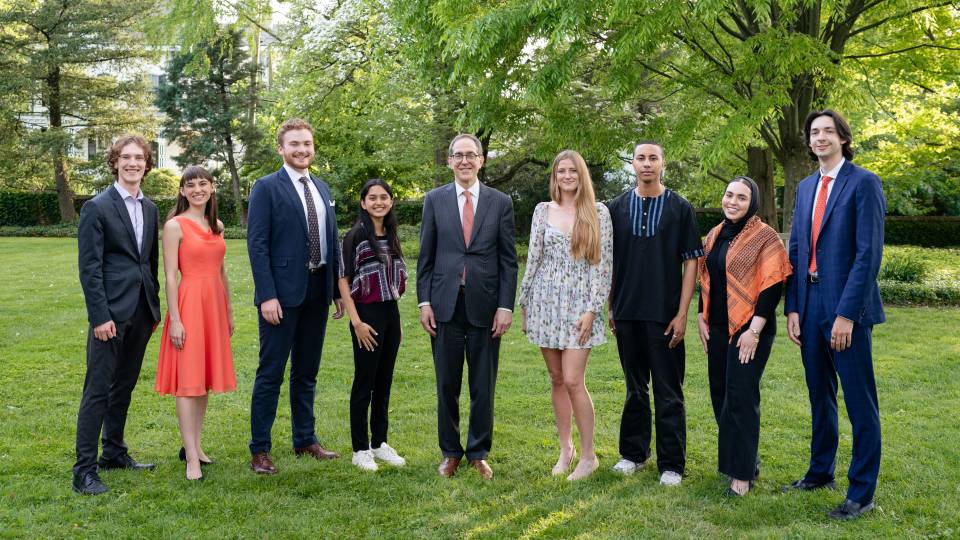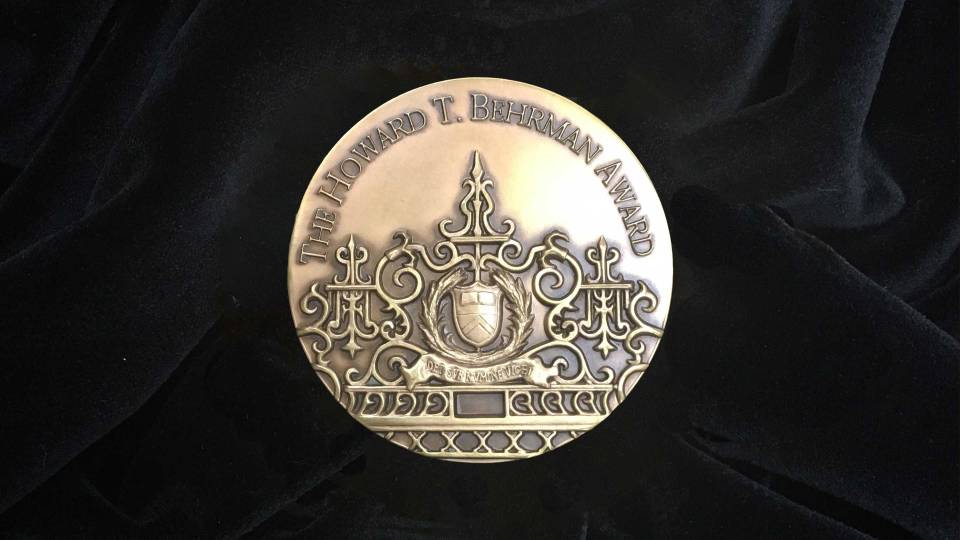Emmy-award winning actor Sam Waterston, known for his longtime role on the NBC series “Law & Order,” addressed Princeton University’s Class of 2024 as its Class Day speaker. He was selected by the class in April to speak at the May 27 ceremony.
--Remarks as prepared--
President Eisgruber, Dean Crotty, Dean Deas, parents of the Class of 2024, distinguished guests.
Princeton Class of 2024, Congratulations! It’s a wonderful world! Love is all around you, your parents are really happy, you’re their pride and joy. Look at what your friends have done! You’ve been no slouch yourself. Four years given to the great things college offers, best of all, talk, talk, talking, to each other. You Carpéd the Diem! Good going.
It’s a wonderful day! I’m so glad, and greatly honored, to be part of it. I’m a grandparent of six. My wife, Lynn, is here, too, with her best friend Di — I’m really only here because of them (and Di’s beloved Julie) — and they’re with me on this: There is nothing like seeing your children and grandchildren thrive, prosper, clear the high jump, beat the odds, and bust out all over. Thank you for inviting me to share in the joy.
The word of one syllable for what you’re swimming in today is play — joy and love combined — and play is what it’s all about.
In “Waiting for Godot,” Lucky starts the last speech he will ever give trying to pack into it everything he knows and coming up with nothing but desperate nonsense.
“Given the existence as uttered forth in the public works of Puncher and Wattmann of a personal God quaquaquaqua with white beard quaquaquaqua outside time without extension who from the heights of divine apathia divine athambia divine aphasia loves us dearly with some exceptions for reasons unknown but time will tell….” and it goes on like that.
As I fretted over what to say today, I felt like him, until I realized what my real problem was: I don’t know what to tell you.
About to give up, it hit me that that’s a good thing for all of us. It’s your turn. Adulthood definitely has its downsides, and you don’t want to let go of your inner child, the you who knows all about play, but nothing holds a candle to adulthood’s upside: becoming your own boss. Graduation is the landmark. It’s official now, and it’s kind of crazy that the first thing the world wants to do is tell you, in a graduation speech, how to think and what to do. I’m not going to try.
The places you and I are in are too different. For you, this is the prime time for action, for seizing the day, time to be out in the world and getting things done.
For me, more and more, the things that give me joy have to do with stopping.
My favorite essayist, Michel de Montaigne, quit — 400 hundred years ago. He quit the French court, where he was an advisor to the king; quit Bordeaux, where he was the mayor, after seeing the city through the pandemic of his time, the Plague, after inventing the public bulletin board which we now know as the internet and social media — “Leaving for Paris Thursday. Want a ride?” “Wine Sale. Best Claret since 1540.” — he quit it all and went home to his medieval estate, holed up in his study at the top of a turret there, invented the essay, which in French means the try, the attempt, as opposed to the last word or the final result, wrote the very first ones, including ones about quitting, and spent the rest of his life getting to know himself by writing about himself.
He stopped. Everything else is forgotten, how good the wine was, who went to Paris, but people still read those essays to find out what it is to be a stand-up guy, an honest, fun, one-of-a-kind straight-shooter, and a friend. Because he stopped.
I quit myself a few of months ago.“Law & Order” was part of my life for two or three decades. That never happens. TV shows come and go. “Law & Order” didn’t. It did for me the long-haul things everyone needs from a job. It kept a roof over our heads. It put our kids through college. It kept me out of trouble. It made it easier to get other work. And it wasn’t work, it was play, and play is what life is all about. (Did I say that already?)
But, and it’s a big but, when I did finally quit, I was amazed by the amount of space that job had been taking up in my head. When I stepped off the set for the last time, I literally, physically, felt a door opening and found a gigantic new room in my head that “Law & Order” had just left empty. It was astonishing and it’s still thrilling. A big piece of myself that I didn’t even know I’d rented out, is mine again.
Not that you stop doing things when you stop what you’ve been doing. But you buy space to think. And to shut up. And to be still.
Spring has been long and slow this year. I love it. I’ve been meditating twice a day for years; I’m feeling its effects. I love it. You have to stop to see the spring. You can’t meditate very well on the run, either. Maybe you look at the news to see what’s getting done. Now, I mostly look to see if anything is ever going to stop.
We don’t get to decide what great question will present itself for resolution in our lifetime, or how. “The Almighty has His own purposes” is how Lincoln explained it. We use different terms, but our experience remains the same: Issues come to a head by a will of their own, or, at least, by no will of our own, and we can’t escape answering them.
Don’t waste a second thinking it can’t be true for you because you’re all still so young. It’s your turn. And there isn’t anything cooler: You don’t get to choose the questions — fate, chance, God, or history do that — but the response belongs to you. If you’re like every generation before you, you’ll keep the ball rolling, but, because the future hasn’t been written, the possibility is there that you will be the ones who finally get the answer right. That’s what the rest of us are rooting for, partly because of our own spotty time at bat. That’s why we’re all so glad you’re here. Phew. Thank God you made it. Just in time!
Your graduation falls this year on Memorial Day. One of the proudest moments in my lucky career came when I got to play the great New York Times journalist, Sydney Schanberg, in “The Killing Fields,” a war movie that wasn’t about the fight, who’s right, or who wins, but about who dies, the civilians and the soldiers, and whose message was, save lives, stop the war.
Every time your cohort succeeds in resolving a conflict before the shooting starts, you’ll get a gold star. But my father, in the Great War of his generation, WWII, volunteered when he would never have been drafted, joined a war which was fought through to final victory and the enemy’s unconditional surrender, stopped the Holocaust, ended a dictatorship, halted a war of conquest and made them illegal. We call it the Good War for a reason.
In my generation, the Great War was Vietnam. Many thought the best thing about it was when it stopped. A kid I grew up with was killed there — Derek Chesebrough — along with tens of thousands of others, potential Einsteins, possible da Vincis, might-have-been Mozarts. Someone has calculated that there are seven active wars going on in the world right now. I think that grossly underestimates the number of issues being resolved by violence, as we speak. What do we do? When do we act? What do we leave alone? Stop or Go. Up to you.
As your kind introduction said, I’m currently the board chair of Oceana. The ocean, for all that it’s foreign territory to us because we don’t breathe water, is as essential to our existence as the air we do breathe. We’ve been beating up on it as hard as we can for centuries. Especially since WWII, we’ve developed the means to actually kill it, just as we developed then, with nuclear weapons, the ability to do ourselves in up here.
We already pollute it, make “dead zones,” underwater deserts; we know how to catch the last fish; with climate change, underwater heat waves remove so much oxygen from the water the sea creatures smother, exactly analogous to us being smothered by the air we breathe, and just as awful to contemplate. If we keep doing these things, we will destroy it, and it will kill us. And what is the cure? Stop. Stop overfishing. Stop carbon pollution. The ocean will bounce back. Stop. A handful of heads of a handful of corporations and our passive dependence on fossil fuels has the future of the planet by the throat. When will they stop? When will we stop?
But — and this talk is full of buts — the only way to stop a catastrophe is to get stuff done. That’s what Oceana does. Dr. Daniel Pauly is a board member of Oceana. He’s also the global expert on fish populations and a great whirlwind of positive energy in the face of a very discouraging set of facts. I once called him an optimist and he gave me what for. He said he is not an optimist. Doesn’t think that way at all. He said he discovered a simple thing when he was very young. Faced with difficulty — and there was plenty of it for a mixed-race child growing up on his own in the midst of harsh indifference and racism — if he did nothing, he felt worse; if he did something, he felt better, so, he’s been doing something ever since. He recommends it to everyone.
Your turn. What’ll it be?
In 1600, the words “to be,” to an Elizabethan ear, meant something like what “to act” or “to go for it” means to us. Listen to that famous soliloquy of Hamlet’s with that in mind: “To be or not to be, that is the question. Whether ’tis nobler in the mind to& suffer the slings and arrows of outrageous fortune, or to take arms< against a sea of troubles, and by opposing end them.” It’s the most interesting question in the world. It is the question. The answer, also from Hamlet, is the pithiest and shortest poem in English: “Let be.” Let, allow, stay still, take it. Be, act, do something, fight back. Which one, when? Your turn! On the one hand, what a fate to wish on anyone. On the other hand, what a trip!
All up to you, but, OK, just this once, here’s what I think: All these opposites, stop and go, let and be, are just dead things. Life is in the air between them. That’s where all the joy and love are, where play is, and play’s the thing that makes life interesting. (Did I say that already?) If that sounds mysterious, you’ll find it out for yourself without even looking, if you can just keep plenty of space in your own heads for yourselves.
Here I am, back where I started.
I played Lincoln. One of the things his law partner, Billy Herndon, said about him was, “He didn’t read many books, but he thought about them a lot.” The play about him I did, by Robert Sherwood, lets you feel the room the Great Plains and the huge sky above them opened up in his head. That space was open in the heads of lots of people back then, when the population was thin and the land was vast.
I’ve played a few of those historical figures, from 19th Century America and before, Jefferson, Thoreau, Paine, David Dickson, characters with lots of fresh air between their ears. I believe the sheer size of the country had something to do with their coming up with — and acting on — The Declaration of Independence and the Constitution, while Europe’s crowded head was — understandably — still full of the Divine Right of kings. Because copying the behavior and thoughts of people around us is as basic an instinct as there is and keeping your own head for yourself is an act of will. It takes will-power.
Flex that muscle. Guard it with your life.
It’s never been easy. Things get scary. One thing Montaigne noticed in getting acquainted with himself was that his mind changed all the time. Hard as that was in the 1500s, in a world like ours, mostly operating without the help of faith, it can feel God-awful lonely. If your mind won’t stand still, where’s the foundation? It made Hamlet crazy. Heck, it scares me.
But what scares me even more is the fantastic amount of head space we’ve given over, in this day and age, first to copycatting others, then to our jobs, and astoundingly now to so-called intelligent machines. We traded the privacy of home, where your thoughts were your own, for connection, gave our castle away first to the telephone, then the radio, then the TV, then the internet, then the cellphone, and, this week, to AI.
And, by God, connection we got. The world isn’t half as solitary as it was. You can reach anyone, anywhere, any time — from the top of Mount Everest — and the world can reach you. The trade-off is, it’s selling you stuff all day long. With algorithms, it can take you down one rabbit hole after another, farther and farther away from your own thoughts, even selling you the idea that you’re better off not having ideas of your own, that identifying with a group is more valuable than anything you could ever think of.
Communication and propaganda become the same thing, the air fills with chatter, noise takes the place of silence, truth has a hard time breathing. And all the data shows, it can be just as lonely. Give me Abraham Lincoln any day, lonely and alone under the great sky in the middle of the vast plains of Illinois, thinking his own thoughts, on his worst night, like he is in Sherwood’s play, or Montaigne in his tower, alone with his books, his thoughts, and his pen, changing his mind every two minutes.
But I have no idea what is the right amount of space in your head for you to keep for yourself and how much you owe the world. That’s for you to say. I don’t know what to tell you. Nobody does. You have all you need: You have minds of your own. It’s your turn. We can’t wait to see what you come up with. Congratulations, and, if you have any complaints about this talk, please take them up with Julie. Congratulations! Thank you.
